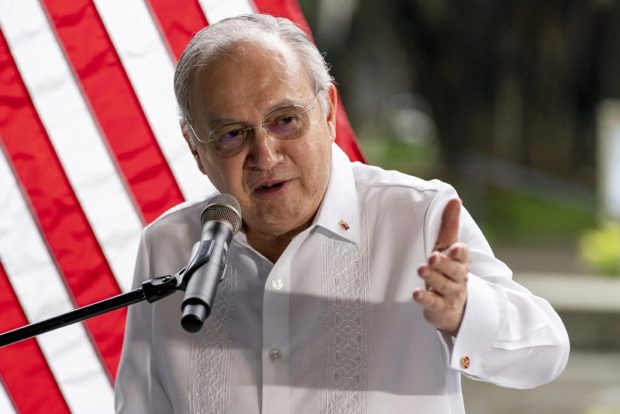US open to forging FTA with Asean, says Romualdez

FILE PHOTO: Philippine Ambassador to the United States Jose Manuel Romualdez (Photo by Andrew Harnik / POOL / AFP)
The United States may pursue a free trade agreement (FTA) with the Association of Southeast Asian Nations (Asean) as it seeks to boost economic activities with the major economic bloc, which bodes well for the Philippines.
Philippine Ambassador to the United States Jose Manuel Romualdez said it was possible for the economic superpower to elevate its trade relations with the region.
“They want to be able to cover the Asean region. The concentration now is to have more economic activities with the entire Asean region,” he said in an event in Makati.
Asean has a combined economic size of $3.2 trillion in 2019, making it the fifth largest economy in the world, according to the Asean website.
Currently, the United States and Asean have a trade and investment facilitation agreement, which seeks to boost economic activities between the parties. It outlines general goals and principles for cooperation to strengthen trade and investment.
Article continues after this advertisementThe FTA talks of the Philippines with the United States, meanwhile, have remained pending, along with the renewal of Generalized System of Preferences (GSP) perks, which expired in 2020.
Article continues after this advertisementThe GSP deal is a unilateral trade agreement extended by the United States to 122 developing and least developed countries, including the Philippines. This allows beneficiaries to have duty-free market access of about 5,000 products to the United States.
“We are working with our trade attaché in Washington, together with other Asean members like Thailand and Vietnam,” Romualdez said.
“There has been some movement in that direction,” he added, noting that the current discussions involving the Indonesian-Pacific Economic Framework for Prosperity (IPEF) have taken priority for now.
The United States launched IPEF last year with the Philippines, Australia, Brunei Darussalam, India, Indonesia, Japan, Korea, Malaysia, New Zealand, Singapore, Thailand and Vietnam.
The members seek to discuss several areas of cooperation, including trade, supply chain, clean energy and anticorruption.
“This framework will advance resilience, sustainability, inclusiveness, economic growth, fairness and competitiveness for our economies,” according to the US Trade Representative. INQ